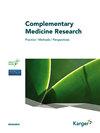An acupuncture protocol for the treatment of erectile dysfunction (ED) - a Delphi-process.
IF 1.1
4区 医学
Q3 INTEGRATIVE & COMPLEMENTARY MEDICINE
引用次数: 0
Abstract
INTRODUCTION Erectile Dysfunction (ED) is a widespread disorder, and the worldwide incidence is rapidly increasing. Acupuncture, an intervention out of the spectrum of Traditional Chinese Medicine (TCM) has a long tradition as treatment for ED. Nonetheless, a best practice treatment protocol is currently missing. A recent systematic review and meta-analysis confirmed a huge diversity of acupuncture treatments for ED and concluded that there is an urgent need to standardize acupuncture treatment for ED. Consequently, the authors conducted a Delphi process with the aim to achieve an expert consensus as a basis for the development of a best practice protocol. METHODS The Delphi process consisted of four rounds of questionnaires with closed and open-ended questions. Eleven acupuncture experts participated. The therapeutic aim was defined as "to achieve an erection sufficient for sexual satisfaction". RESULTS Consensus was achieved on 24 acupoints corresponding to 12 TCM syndromes. The syndromes were KI Yang xu, KI Yin xu, KI Qi xu, Ki and HT not harmonised, LR Qi Stagnation, LR Qi stagnation and Heat, Liver Blood xu, Liver Blood xu and Liver Qi stagnation, Damp-heat sinking to the lower Jiao5, HT and GB Qi xu, SP xu and HT Blood xu, Yin xu. The suggested optimal dose was between11-15 treatments given once or twice a week. CONCLUSION An expert consensus-based, semi-standardized best practice treatment protocol for the treatment of ED was developed. Moreover, the Delphi process also revealed inconsistencies as to which signs and symptoms constitute a TCM syndrome. Further Delphi studies including a broader range of experts from various acupuncture traditions are needed to establish further agreement. Nonetheless, the best practice protocol introduced in this paper provides a first point of departure for the implementation of a more standardized treatment approach. Moreover, since a recent meta-analysis concluded that more high-quality clinical studies on the topic are needed, this paper provides a first standardized acupuncture treatment protocol for ED.针灸治疗勃起功能障碍(ED)方案--德尔菲过程。
简介:勃起功能障碍(ED)是一种普遍存在的疾病,其发病率在全球范围内迅速上升。针灸作为传统中医(TCM)的一种干预手段,在治疗勃起功能障碍方面有着悠久的传统。然而,目前尚无最佳治疗方案。最近的一项系统综述和荟萃分析证实,针灸治疗 ED 的方法多种多样,并得出结论:迫切需要规范针灸治疗 ED 的方法。因此,作者开展了德尔菲进程,旨在达成专家共识,为制定最佳实践方案奠定基础。11 位针灸专家参与了这一过程。治疗目的被定义为 "使阴茎勃起达到性满足"。这些证候包括:祺阳虚、祺阴虚、祺气虚、祺与 HT 不协调、LR 气滞、LR 气滞热、肝血虚、肝血虚与肝气郁结、湿热下注下焦5、HT 与 GB 气虚、SP 虚与 HT 血虚、阴虚。建议的最佳剂量为 11-15 个疗程,每周 1-2 次。此外,德尔菲法还揭示了哪些体征和症状构成中医综合征的不一致之处。要进一步达成一致意见,还需要更多来自不同针灸传统的专家参与德尔菲研究。尽管如此,本文介绍的最佳实践方案为实施更加标准化的治疗方法提供了第一个出发点。此外,由于最近的一项荟萃分析得出结论认为需要对该主题进行更多高质量的临床研究,因此本文提供了首个针对 ED 的标准化针灸治疗方案。
本文章由计算机程序翻译,如有差异,请以英文原文为准。
求助全文
约1分钟内获得全文
求助全文
来源期刊

Complementary Medicine Research
Medicine-Complementary and Alternative Medicine
CiteScore
2.90
自引率
5.60%
发文量
50
期刊介绍:
Aims and Scope
''Complementary Medicine Research'' is an international journal that aims to bridge the gap between conventional medicine and complementary/alternative medicine (CAM) on a sound scientific basis, promoting their mutual integration. Accordingly, experts of both conventional medicine and CAM medicine cooperate on the journal‘s editorial board, which accepts papers only after a rigorous peer-review process in order to maintain a high standard of scientific quality.
Spectrum of ''Complementary Medicine Research'':
- Review and Original Articles, Case Reports and Essays regarding complementary practice and methods
- Journal Club: Analysis and discussion of internationally published articles in complementary medicine
- Editorials of leading experts in complementary medicine
- Questions of complementary patient-centered care
- Education in complementary medicine
- Reports on important meetings and conferences
- Society Bulletins of Schweizerische Medizinische Gesellschaft für Phytotherapie (SMGP) and Deutsche Gesellschaft für Naturheilkunde
Bibliographic Details
Complementary Medicine Research
Journal Abbreviation: Complement Med Res
ISSN: 2504-2092 (Print)
e-ISSN: 2504-2106 (Online)
DOI: 10.1159/issn.2504-2092
www.karger.com/CMR
 求助内容:
求助内容: 应助结果提醒方式:
应助结果提醒方式:


